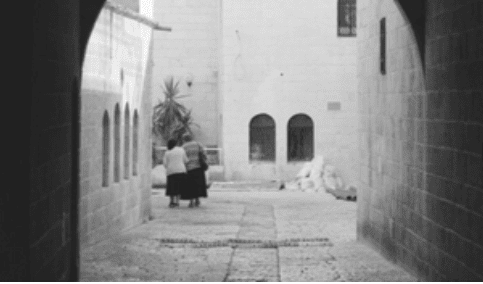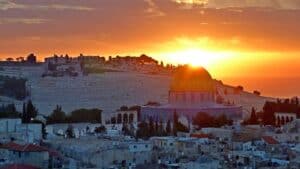
During the season of Lent, Churches for Middle East Peace is focusing on Jerusalem as a city shared by three faiths: Judaism, Christianity, and Islam. This week, we look closer at the deep meaning Jerusalem holds for Christians.
After this there was a feast of the Jews, and Jesus went up to Jerusalem. Now there is in Jerusalem by the Sheep Gate a pool, in Aramaic called Bethesda, which has five roofed colonnades. In these lay a multitude of invalids—blind, lame, and paralyzed. One man was there who had been an invalid for thirty-eight years. When Jesus saw him lying there and knew that he had already been there a long time, he said to him, “Do you want to be healed?” the sick man answered him, “Sir, I have no one to put me in the pool when the water is stirred up, and while I am going another steps down before me.” Jesus said to him, “Get up, take your bed, and walk.” And at once the man was healed, and he took up his bed and walked.
~ John 5:1-9
For Christians, the city of Jerusalem has deep theological significance as the place where Jesus traveled to participate in traditional Jewish feasts, performed healings, and in the end was crucified, buried, and resurrected. Today, there are many sites that commemorate these events in Jesus’ life.
One such place is the pool of Bethesda, where Jesus healed the man we read about in the beginning of John 5. Today, many Christian pilgrims visit St. Anne’s Church, believed to be the location of the pool of Bethesda, as well as the birthplace of Mary, Jesus’ mother.
Christians from the Middle East and around the world make pilgrimages to these sites, and many others in and around Jerusalem, and the Holy Land. These pilgrims seek to educate themselves about the roots of their faith, and to deepen their spiritual lives through these experiences.
Christians from around the world make pilgrimages to educate themselves about the roots of their faith, and to deepen their spiritual lives through these experiences.
Today, there are many Christians, representing a multitude of denominations, who worship in churches in the Old City, around Jerusalem, and the West Bank. Recently, Christian leaders in Jerusalem received word that the municipality intended to break a centuries-long status quo agreement and begin to collect taxes on church properties not used as houses of worship. The leaders of these churches issued a statement, saying, “We declare that such a measure both undermines the sacred character of Jerusalem, and jeopardizes the church’s ability to conduct its ministry in this land on behalf of its communities and the world-wide church.”
As we continue to fix our eyes on Jerusalem in prayer this Lent, let us remember our Christian siblings who live in the Holy Land, as well as those who make pilgrimages to grow in their faith. Let us pray for the churches who minister to these people daily.
Dear God,
Again, we pray for the peace of Jerusalem. We pray for the Christians who call the city home, and for those who make pilgrimages to visit its holy sites and grow in their faith. We pray for peace as policies arise which seem to threaten the ability of these historical churches to fulfill their mission. As we pray for our Christian siblings, we continue to also pray for Jews and Muslims, who also call Jerusalem holy. We pray for peace within and among these three religions.
In your name we pray, Amen.
Molly Lorden is the CMEP1835 Coordinator for Churches for Middle East Peace. She is also currently studying toward a Master of Divinity at Princeton Theological Seminary. This article first appeared on Churches for Middle East Peace.


